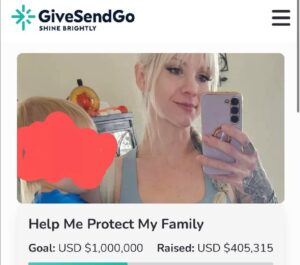⚡ Cutting through noise. Spotlighting the truth.
Selective Outrage: Why Only Some Crowdfunders Get Cancelled

When Shiloh Hendrix launched a GiveSendGo campaign after a viral video showed her using a racial slur against a child, the internet exploded. But just weeks earlier, another controversial fundraiser—this time supporting a teenager charged with murder—raised over $500,000 with far less backlash. Both sparked heated debates, yet only one was branded as hate-funding. The Shiloh Hendrix fundraiser is exposing a deeper inconsistency in how society reacts to outrage, identity, and online support.
Two Viral Stories, Two Very Different Reactions
On April 2, 2025, 17-year-old Karmelo Anthony was accused of fatally stabbed another student, Austin Metcalf, during a high school track meet in Frisco, Texas. He was charged with first-degree murder and later released on a reduced bond. His family launched a crowdfunding campaign that raised over $500,000 to support legal defense and relocation due to alleged threats. The media reported on the facts, and while opinions varied, the campaign itself avoided being labeled as toxic.
Compare that to Shiloh Hendrix, who was caught on camera in late April using a racial slur against a Black child at a Rochester, Minnesota park. She claimed the boy stole from her baby’s diaper bag. The incident was recorded and published by bystander Sharmake Omar, who then allegedly leaked Hendrix’s personal information, including her address and Social Security number. Following escalating threats, Hendrix launched a GiveSendGo campaign titled “Help Me Protect My Family,” which has since raised over $590,000. Yet instead of focusing on the incident or the doxxing, much of the public response has centered on the fundraiser itself—calling it offensive, dangerous, even hate-fueled.
Fundraising or Weaponizing Outrage?
The Shiloh Hendrix fundraiser quickly became a lightning rod in a larger debate about speech, race, and justice. Civil rights groups condemned the campaign as a reward for racism, while her supporters defended her right to raise funds in the face of threats and public exposure.
Meanwhile, in the Karmelo Anthony case, the severity of the crime, first-degree murder—did not trigger equivalent criticism of the fundraising platform or the donors supporting him. Despite the victim being White and unarmed, media framing leaned toward contextualizing Anthony’s actions as potentially defensive or misunderstood.
So why the difference?
Expert Insights
Jacob Wells, co-founder of GiveSendGo, issued a statement defending both campaigns:
“GiveSendGo does not endorse or condone the personal views or actions of individual campaign organizers. We are a platform for people to receive help, not a judge of their character.”
(Source: Washington Post)
In contrast, the Rochester NAACP stated:
“Many of the comments from her supporters celebrate and justify her hate. We’ve been asked by countless community members how they can help. This campaign is our answer.”
(Source: KTTC News)
However, critics have pointed out that the NAACP and other advocacy groups have been noticeably silent on hate-filled comments aimed at White individuals in support of the Karmelo Anthony campaign. Despite graphic remarks and calls for racial revenge found in some public threads, few organizations condemned the tone of that fundraising support. This silence has fueled further accusations of selective moral outrage.
Contrasting Views: Who Gets Cancelled?
Critics of the Hendrix Campaign Argue:
- Her use of a racial slur was harmful and shouldn’t be rewarded
- The campaign normalizes hate and emboldens racism
- GiveSendGo should remove fundraisers that spread harm
Supporters Counter That:
- She was doxxed and threatened; the campaign is about safety
- Free speech rights apply even to offensive people
- Karmelo Anthony’s campaign wasn’t attacked, proving the double standard
People Also Ask
Q: Why did Shiloh Hendrix start a fundraiser?
After her video went viral and personal information was leaked by a bystander, Hendrix claimed her family was in danger. She created the GiveSendGo fundraiser to help relocate.
(Source: Washington Post)
Q: Who is Karmelo Anthony and what happened at the track meet?
On April 2, 2025, 17-year-old Karmelo Anthony was arrested and accused of fatally stabbing another student at a high school track meet in Frisco, Texas. He’s currently under house arrest awaiting trial.
(Source: WFAA News)
Q: Are crowdfunding platforms responsible for campaign content?
GiveSendGo says it does not moderate based on ideology. Critics argue platforms have a moral responsibility to reject hate-linked fundraising.
(Source: People.com)
Wrap-Up
- The Shiloh Hendrix fundraiser has drawn more outrage than a campaign for a teen facing murder charges
- Doxxing, not violence, was the reason behind Hendrix’s fundraiser
- Public outrage often reflects identity, not just facts
- The media’s selective framing fuels division more than resolution
Sources and Further Reading
Washington Post – Hendrix fundraiser
Free Speech in 2025, America and the World’s Tightening Grip




